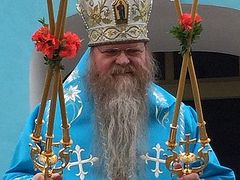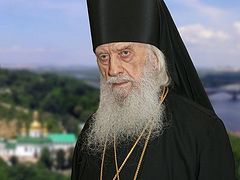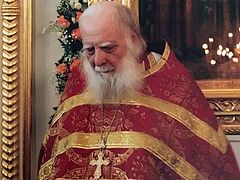Exactly 25 years ago on November 2, 1995, Metropolitan John (Shychev) of St. Petersburg and Ladoga fell asleep in the Lord. He was a wonderful archpastor, a gentle intercessor in prayer, and an outstanding preacher who was able to awaken many thousands of his countrymen from spiritual slumber.
We present the memories about the archpastor of blessed memory by Tatiana Veselkina, our contributor, whose life-transforming meetings with Vladyka John have forever entered the spiritual treasure chambers of her heart.
 Vladyka Metropolitan John (Snychev)
Vladyka Metropolitan John (Snychev)
Once, in the early days of my journalistic pursuits and soon after the famous coup of the 90s, when many of us had so assumed that freedom of speech was more or less a given, our youth-oriented newspaper began publishing articles under the heading “Strictly Personal.” The newspaper no longer exists but my memories of Vladyka can perfectly fit in that section.
My path towards my meeting with Vladyka Metropolitan John (Snychev) began long before I met him. A chain of events and various encounters over the course of two and a half years preceded our meeting that took place during the bright Paschal days of 1991.
On the eve of the feast commemorating Sts. Cosmas and Damian on November 14, 1988, my grandmother Maria had momentarily lost her eyesight. We didn’t even have a chance to get sufficiently scared as it soon returned and she told me, “You just don’t understand anything.” Somehow feeling my grandma’s grief over my knowing no prayers, I promised to learn some by heart. However, in that particular instance, she likely had something else in mind…
“Find Fr. Abel,” she said. I did not make much out of her request, as I knew no priests in Ryazan at the time.
The next morning, my grandmother got dressed in her best, said her prayers one last time on earth, and peacefully departed this life unto the Lord. It was akin to sleep. It did look like she fell asleep, as there was no fear during those mournful days, only an endless desire to stay close to her listening intently to the unfamiliar words of the Psalter and wondering why those who came to pay last respects to my grandmother kept asking, “Where did you spill the perfume?” Our visitors marveled while I was left wondering about the origin of that fragrance.
During the days following the funeral I would often end up at one church, the Cathedral Church of Sts. Boris and Gleb in Ryazan. Every time I was there, for some reason, I kept asking those who worked there: “Where is Fr. Abel? How can I find him?” (Even today I still don’t know what I’d tell Fr. Abel had he come to see me). I was told he wasn’t serving due to illness. Still, I kept on asking.
Winter somehow went by. The spring of 1989 arrived, the first year following the 1000th anniversary of the Baptism of Rus. That spring I had received my first professional assignment as a newspaper journalist: I interviewed the Most Reverend Simon (Novikov), Archbishop of Ryazan and Kasimov. It became his first-ever interview and the first one in decades that was published on the pages of the youth newspaper I worked for at the time.
It turned out Ryazan wasn’t ready for this kind of a “meeting.” The local commissioner for religious affairs whom the editors asked to approve the interview, as was customary at the time, demanded the removal of the word “Vladyka” and that it be replaced by the Archbishop’s secular surname, first name and patronymic. Our standoff lasted a few days. I did agree to remove the “undesirable” names from my original text, but as soon as the commissioner approved the interview, I re-inserted every single word, including the “Vladyka” and “The Most Reverend,” before the article was sent for printing. As for the commissioner, well, I never saw him again…
During our conversation, Vladyka Simon told me about the newly reopened St. John’s monastery located not far from Ryazan and blessed me to write about it. On May 21, the feast day of the Holy Apostle John the Theologian the beloved disciple of Christ, the cathedral in his name was consecrated in the monastery. Our crew of a photographer and myself arrived at the monastery. Light rain was drizzling while we walked to the ruined monastery walls towards a 71-meter high bell-tower topped with a rusty skeleton of a former dome.
The cathedral church had up until recently been used to store equipment and fuel, so a layer of linoleum was temporarily placed on top of the dirt floor just in time for the consecration service. The church was packed. There were even some who still remembered the monastery “alive,” its former abbot, and the monks. It was the first time I celebrated the feast of the Apostle John the Theologian (Vladyka John was born on December 9, the day of remembrance of the Apostle St. John the Theologian).
A month or two later, I came to the monastery again. It was a weekday. There were a few novices and old women, the regulars among locals. The service was over by then and they were chanting the panikhida. I joined the old ladies who stood around the memorial candle stand. Suddenly I heard the steps as someone was going down the stairs from the choir balcony. A monk, advanced in years, blessed those who prayed and left the church with the rest of the faithful.
 Holy Hieromartyr Juvenaly (Maslovsky) A group of either tourists or pilgrims stopped him and asked about the monastery. The monk (I figured out by then that he was in charge there) gave a brief summary adding in the end, “Even Vladyka Juvenaly said that once the churches reopen, our monastery would open, too.” By then, I had read enough about Orthodoxy in the region of Ryazan but I had never come across the name of Vladyka Juvenaly. So I asked who he was.
Holy Hieromartyr Juvenaly (Maslovsky) A group of either tourists or pilgrims stopped him and asked about the monastery. The monk (I figured out by then that he was in charge there) gave a brief summary adding in the end, “Even Vladyka Juvenaly said that once the churches reopen, our monastery would open, too.” By then, I had read enough about Orthodoxy in the region of Ryazan but I had never come across the name of Vladyka Juvenaly. So I asked who he was.
Vladyka Juvenaly was the bishop of Ryazan in the 1930s. He was arrested in 1936. Nothing else is known about him. All we have left is his letters from exile.
In some inexplicable way, I had an inkling this man shouldn’t be forgotten and so I asked, “Where are they? Can I see them? I’d like to write about His Grace. And the monastery, too.”
“They are at my house in Ryazan,” the abbot of the monastery, as it turned out later, answered. “You can stop by at such and such address and I will show them to you.”
“What is your name?” I asked as our dialogue lingered on.
“Father Abel,” he replied.
By then, I was no longer looking for Fr. Abel. Life carried on as usual.
Much later, when I got in touch with various archives in Siberia, I was able to find out that Archbishop Juvenaly (Maslovsky) of Ryazan and Shatsk was executed on the eve of October 25, 1937, in Tomsk, according to a report from the prison camp’s administration (it was still in operation at the time).
As I was gathering materials about Archbishop Juvenaly, I found in the archives a great number of documents about other martyrs who suffered for their faith. Alongside my main search, I also gathered a lot of documentation about local saints and ascetics. The materials could go into short stories and articles but most of them were left unfinished due to the lack of one or another specific specific biographical information. Once I told a nun I knew about it and heard back, “You need to go to Vladyka John.” She found the Annual Orthodox Calendar, where I first saw Vladyka. It happened shortly after Metropolitan John was appointed to the see of St. Petersburg.
The First Meeting
Never doubting the relevance of my research, I immediately wrote a letter to St. Petersburg. A few days passed and it dawned on me: it was useless to write him, he must be too busy to read letters. But the reply came quite soon. In his letter, Vladyka John wrote:
“I am very glad you are working hard, like a bee gathering this priceless material about our sufferers for the faith and virtue. May the Lord help you in your good work! Do you feel like seeing me? I do welcome this wish of yours. But there is something that will delay our meeting. On March 11 (1991.—T.V.) I will be admitted to a hospital for planned examinations and treatment. Let’s rely entirely on God’s will. I will give you my phone number so you can call me in the middle of April and find out whether I am at home or the hospital. May the Lord protect you! With love in Christ, Met. John.”
In a month or so, I called that number and heard a man’s voice on the other end of the line. Automatically thinking he was either a secretary or a sub-deacon, I asked him to connect me with Metropolitan John.
“Metropolitan John speaking,” I heard, and then Vladyka called me by name.
Hearing this, I was completely lost for words. How could anyone know the name of an unfamiliar caller? Vladyka himself broke the silence, saying that I could come and work with the publications that interested me. He also asked me to tell him in advance about the date of arrival and my train’s number. That was what he would always do afterward—he would find out the time of the train’s departure, make the sign of the cross over the train I was to depart on, pray, and even check my ticket—Did I tell him right I had a lower berth, or did they sell me a ticket with an upper berth? Did I dress warm enough for my train ride?
Unfortunately, it wasn’t easy to finish my first obedience (I understood obedience quite vaguely at the time). Thoughts like “well, it’s awkward to call… What if I bother him…” swarmed in my head. But a few minutes before my departure, I did call him. Vladyka blessed me to call him immediately upon arrival at the train station. It was my second obedience.
I had a second-class ticket to St. Petersburg, so I knew in advance that a sleepless night was guaranteed. However, as soon as my head touched the pillow, I was fast and blissfully asleep like a baby.
I had a dream. I am in a large house. I go down the wooden stairs so narrow my foot barely manages to find support. The stairs creak under my weight (I hear the sound as if I am awake). I am trying to grab the banister, but it turns into a green flowering branch. I am afraid I am going to fall. All of a sudden, I hear a voice coming from above speaking to me imperatively yet softly, “Tatiana, come back!” I lift my head and see a slightly swinging, pinkish-blue glittering cloud. Next, I wake up. The train had arrived in St. Petersburg.
It was the end of April. The weather is still frosty. The clock shows about 5:30 am. It wouldn’t be an exaggeration to say that calling and waking up Vladyka proved to be a bit too much for me. Besides, my mom had asked me to deliver a package to a friend, and I had to take a ride by commuter train, just thirty minutes from Saint Petersburg. I thought I would deliver the package first and then call Vladyka. But I was punished for my willfulness. As I exited the commuter train, I took a bus going in the opposite direction from where I needed to be. I exited it in the middle of the ride, dragged myself across the slippery snow back to the train station, and called Vladyka right away.
The first thing Vladyka John asked was why I hadn’t called him at once, and upon hearing my heartfelt explanation, chided me saying that he needs to leave right away to receive visitors at the Academy.
Occasionally, Vladyka took time off to stay in the hospital. His legs bothered him. When he was at home, he usually worked in his cell located on the second floor. I initially thought that Vladyka would direct me to work at the Academy’s library or elsewhere, but the elder assigned me to stay in his study on the first floor of his residence. Anna Stepanovna Ivanova, who had the obedience of a secretary to the Metropolitan, brought all the necessary documents there. The books, mostly published abroad, were type-written copies and bound by hand. In other words, a treasure trove!
For four days I worked at the Metropolitan’s table until dark. I made tape recordings of some things and took copious notes for others. I found familiar names and unknown facts, immersed myself again in the books and type-written copies, and soon the material filled a few legal pads and cassettes. I took a break only when Matushka Olympiada called me to eat.
One day, Valentina Sergeevna Dyunina, Vladyka’s doctor (nun Barbara in the future) entered the room. She told me that I looked familiar and asked if I ever visited Samara where Vladyka John had served in the past. She also mentioned that he spoke about me a lot. I was surprised, for I had neither been to Samara nor shared any details about my life with Vladyka.
When the fourth day of my work at the archpastor’s study came to an end, Vladyka blessed me to visit some sights around St. Petersburg on the last day of my stay there.
At our parting, matushka Olympiada offered me a meal and a few Pascha eggs, some kulich, oranges, tasty sandwiches, and pies for my trip back home.
“Come visit us again,” said Anna Stepanovna.
The tears gave me away and were ready to stream down like a mad torrent. I wish there was someone who could understand how difficult it was to hear her words. During these last four days, the luxurious residence at Stone Island had become my home. The luxury of the place wasn’t the reason, since the Lord had previously allowed me to travel abroad and I had seen a lot of nice places. It was clear as day that I would never return here again; my job was finished. So here I was, standing there, biting my lips and holding back tears. I went upstairs to see Vladyka. He blessed me, placing his hand on my head. As I stood there, I felt as if I was bathing in a pool of love, inexplicable and inimitable. But now it was time to bid farewell.
I turned around and started going downstairs so that Vladyka wouldn’t see me crying. The stairs grew narrower and all of a sudden, they creaked softly. I looked down and I realized that below me is the same room (looking down from the top of the stairs) I had seen in my dream on the train ride to St. Petersburg. The tears welled up. Suddenly, I hear a firm voice saying: “Tatiana, come back!” I raise my head and Vladyka is standing at the top of the stairs. I went up and he made a broad sign of the cross over me, presenting a Pascha egg and saying, “Christ Is Risen!”
I wept bitter tears. The passersby on the streets and in the metro stared at me. The tears stopped only when I settled inside a first-class compartment and fell fast asleep. It seemed as if only a minute had passed, but the train was already approaching Moscow’s Leningradsky station.
Written between October 2005 and October 2020
To be continued: The Second Meeting. A Miracle on the Road




